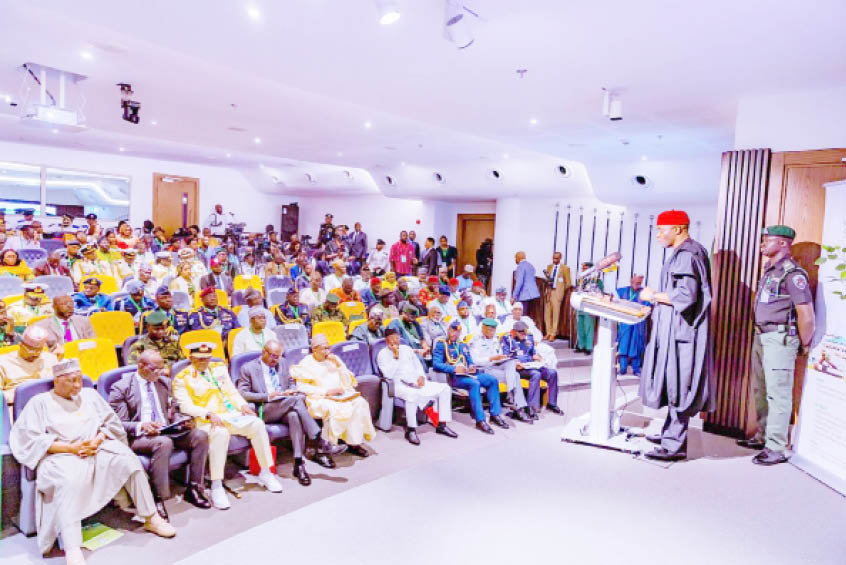By Itodo Daniel Sule, Balarabe Alkassim & Idowu Isamotu
President Bola Ahmed Tinubu has called for an urgent overhaul of Nigeria’s security framework through constitutional reform, declaring that the establishment of state police is now a necessity given the country’s deepening security challenges.
SPONSOR AD
He spoke yesterday in Abuja during a one-day legislative dialogue on constitutional review and national security architecture, organised by the House Committee on Constitution Review in collaboration with the Office of the National Security Adviser.
Tinubu, who was represented by the Minister of Defence, Mohammed Abubakar Badaru, at the high-level Legislative Dialogue on Nigeria’s National Security Architecture, said the current centralised security system need reform to address evolving security challenges.
“The debate over State Police is no longer theoretical. It is grounded in the daily fears and live anxieties of Nigerians: farmers afraid to tend their fields, traders unsure of safe passage, and communities abandoned to self-help,” Tinubu said.
The President described Nigeria’s 1999 Constitution as foundational to its democracy but outdated in dealing with modern security threats. He cited the rising complexity of terrorism, cybercrime, farmer-herder conflicts, piracy, and separatist agitations as clear indicators that the current legal framework is inadequate to secure Nigeria’s vast and diverse territory.
“The pace of change in technology, in the complexity of security threats, and in the dynamics of our federal structure has far outstripped the capacity of some constitutional provisions. Our Constitution must evolve or risk becoming a danger to the very unity it was meant to protect,” he said.
Tinubu called for bold constitutional amendments that would move policing from the Exclusive Legislative List to the Concurrent List, enabling states with capacity and political will to establish their own police forces. He said such a move would ensure more accountable, community-based policing while preserving federal coordination and oversight.
“We must learn from global best practices, adapting decentralised policing models that enhance local accountability without sacrificing national oversight,” the President noted.
Daily Trust reports that the president’s position adds federal weight to growing calls from governors, traditional leaders, and civil society for state police as a solution to Nigeria’s overstretched and often underperforming security agencies.
Tinubu in his address acknowledged recent gains made through enhanced coordination among national security agencies, particularly the synergy between the Office of the National Security Adviser (ONSA) and the armed forces. He noted that joint task force operations, intelligence fusion, and synchronised air and ground offensives have led to the dismantling of terrorist camps in the North-East and criminal enclaves in the North-West.
Abbas, Ribadu, CDS, Kalu harp on constitutional reforms to tackle insecurity
In his remarks, Speaker of the House of Representatives, Abbas Tajudeen said the dialogue was timely, given the urgent need to review and update existing laws to address current and emerging security threats.
He said Nigeria’s complex security landscape demands strategies that are “multi-dimensional, inclusive, technology-driven, and adaptable,” anchored in a solid legal and institutional framework.
In his remarks, Deputy Speaker and Chairman of the Constitution Review Committee, Benjamin Kalu, described the dialogue as a necessary diagnostic process.
He said previous legislation on security was often developed without adequate input from those directly involved in frontline operations.
Also speaking, Chief of Defence Staff, Gen. Christopher Musa, also called for urgent legal and constitutional reforms to address emerging threats like cyber warfare, hybrid threats, and insurgency.
He described the current legal framework as increasingly inadequate and highlighted operational ambiguities such as unclear command authority and detention procedures that hamper effectiveness during internal operations.
The National Security Adviser, Nuhu Ribadu, said security and constitutional order are deeply intertwined.
Ribadu, represented by the National Coordinator, National Centre for Anti-Counter Terrorism, Maj.Gen Adamu Laka, emphasised that a responsive, inclusive, and forward-looking constitution is essential for fostering national unity and addressing the root causes of insecurity.
IGP, state assemblies disagree over state police proposal
Meanwhile, the Inspector General of Police, Kayode Egbetokun, and Chairman of the Conference of Speakers of State Houses of Assembly, Debo Ogundoyin, yesterday, expressed opposing views on the ongoing debate over the creation of state police.
Speaking at the dialogue, Egbetokun, represented by the Commissioner of Police in charge of Legal at the Nigeria Police Force, CP Ohiozoba Ehiede, argued that the Nigerian Police Force should rather be strengthened and better funded instead of creating state police structures.
However, Ogundoyin countered the IGP’s stance, stating that Nigeria’s escalating security challenges demand a multi-level policing approach, including the establishment of state police to enhance local security responsiveness.
The journey so far on state policing in Nigeria
The call for state policing in Nigeria has evolved from demands by a few regional leaders to a full-blown national discourse, deeply rooted in the country’s persistent security challenges and its centralised federal structure.
In February 2024, President Tinubu met with state governors in Abuja during which they considered “the possibility of setting up state police.”
Details of the meeting were disclosed by Information Minister, Mohammed Idris who addressed journalists after the meeting.
Idris said the attendees at the meeting agreed on the need for state police but more discussions are still needed on how to implement it.
The president’s meeting with the governors came amid surge in insecurity across the country.
Nigeria’s policing system has been centralised since independence in 1960, with the Nigeria Police Force (NPF) under the exclusive control of the federal government. Over the decades, several commissions, including the 2006 M.D. Yusuf-led Presidential Committee on Police Reform and the 2012 Parry Osayande Committee, recommended decentralising the police to improve local security delivery.
However, successive governments have shied away from implementing these reforms, largely due to concerns over national cohesion and political abuse.
In 2021, the governors of the 17 southern states unanimously endorsed the creation of state police during their meetings in Asaba, Lagos, and Enugu. They argued that only localised policing can effectively tackle region-specific crimes.
The delay by four states – Adamawa, Kwara, Kebbi and FCT to submit their positions on state police had delayed the National Economic Council (NEC) from deliberating and taking position on the matter.
However, at their last meeting, it was learnt that the affected states have submitted their positions to NEC and the issue will be deliberated to arrive at a position during the next NEC meeting.
State police already existing – Expert
Meanwhile, in an interview with Daily Trust last night, a retired director at Department of State Services, Mike Ejiofor, explained that there is already an existing State police in many states.
Ejiofor, who is also the of President Alumni Association of the National Institute for Security Studies (AANISS), stressed that there is a need to formalise and legalise already existing State police.
He said, “If you look at it, virtually all the states have their own state police all in the name of one task force or the other. Why not formalise it?”
The security expert cautioned those who are afraid that the state police would be abused not to panic, adding that what is important is to ensure that the legal framework caters for political influence.
“That matter had been concluded before, and the 36 State governors have keyed into it. What is being done now when he (President) made that statement is how to fine-tune the legislative framework for the establishment of the State police which is being organized by the House of Representatives.
“You know the Deputy Speaker is the Chairman of the Constitution Review committee. It is a forgone conclusion because that is the best way to go, and my reasons are obvious.
“Like I stated earlier, the Nigerian police is too centralised for effectiveness. Not only too centralised, they are ill-equipped and underfunded. So, when the governors own their own police, they will be their own Chief Security Officer, and the bulk of the staff will be drawn within that environment.
“They will also help in the intelligence gathering. They are not going to be in competition with the Nigerian police, it is just to assist but the fear of many people is that it would be abuse.
“The legal framework can make it have IG’s representation particularly in the recruitment process so that it doesn’t have some political influence. The people recruiting need to get the traditional rulers involved in the process.
“Like I recommended, the prospective employees will get an endorsement from the traditional rulers, and they will go to the DPO to confirm that that person had criminal records. That’s what I expected the legal framework to contain.
“Anybody that says State police would be abused should also know that the Nigerian police also abuse people’s rights but people have gotten judgment against it.
“Though, not all the States can afford the State but the States that can afford should go ahead once the constitution is amended and let’s see how it goes. We cannot just throw away the baby with the bathwater because of fear that it will be abused.”
Do you want to share a story with us? Do you want to advertise with us? Do you need publicity for a product, service, or event? Contact us on WhatsApp +2348183319097 Email: platformtimes@gmail.com
We are committed to impactful investigative journalism for human interest and social justice. Your donation will help us tell more stories. Kindly donate any amount HERE






